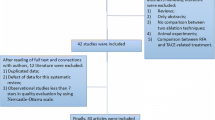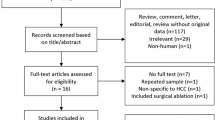Summary
BACKGROUND: Radio-frequency ablation (RFA) is the latest developed and widely practised local ablation therapy for liver tumours. It has the merit of effective tumour ablation and preservation of the maximal normal liver parenchyma. In the past few years, there has been tremendous expansion in the application of RFA for hepatocellular carcinoma (HCC) patients. However, the therapeutic effect of this local-ablation treatment needs to be balanced against its risks and possible local failure. METHODS: This review focuses on the current status of RFA for HCC, with attention to its indications, approaches, risks, local failure, and survival benefit. RESULTS: Although the results of most clinical studies of RFA seem optimistic, the associated complication and tumour recurrence should not be overlooked. Careful patient selection, meticulous RFA techniques, and prompt treatment of residual and recurrent tumours are necessary to ensure a better outcome after RFA. CONCLUSIONS: Until recently, there has been no strong evidence showing that RFA can replace any treatment modalities in the management of HCC. Nonetheless, more convincing evidence by randomised trials is required for the establishment of a treatment protocol of RFA for HCC patients.
Zusammenfassung
GRUNDLAGEN: Die Radiofrequenz-Ablation (RFA) ist die zuletzt entwickelte und häufig angewendete lokal-ablative Therapie für Lebertumore. Sie ermöglicht die effektive Tumorablation bei größtmöglicher Erhaltung von normalem Leberparenchym. In den letzten Jahren kam die RFA bei Patienten mit hepatozellulärem Karzinom (HCC) stark vermehrt zum Einsatz. Die therapeutische Wirkung dieser lokal-ablativen Behandlung muss jedoch gegenüber ihren Risiken und einem möglichen lokalen Therapieversagen abgewogen werden. METHODIK: Diese kritische Übersicht konzentriert sich auf den gegenwärtigen Stand der RFA bei HCC mit besonderer Beachtung ihrer Indikationen, der Methodik, der Risiken, des lokalen Therapieversagens und der Verbesserung der Überlebenszeit. ERGEBNISSE: Obwohl die Ergebnisse der meisten klinischen Studien zur RFA optimistisch scheinen, sollten die damit verbundenen Komplikationen und Tumorrezidive nicht übersehen werden. Sorgfältige Patientenauswahl, genaueste RFA-Techniken und prompte Behandlung von Residual- und Rezidivtumoren sind notwendig, um ein besseres Ergebnis nach RFA sicherzustellen. SCHLUSSFOLGERUNGEN: Bis vor kurzem gab es keine ausreichenden Beweise dafür, dass die RFA andere Behandlungsmethoden des HCC ersetzen kann. Überzeugendere Daten aus randomisierten Studien sind notwendig, um ein Behandlungsprotokoll für die RFA bei Patienten mit HCC zu etablieren.
Similar content being viewed by others
Author information
Authors and Affiliations
Corresponding author
Rights and permissions
About this article
Cite this article
Ng, K.K., Fan, S.T. Current status of radio-frequency ablation for hepatocellular carcinoma. Eur Surg 36, 322–330 (2004). https://doi.org/10.1007/s10353-004-0103-6
Issue Date:
DOI: https://doi.org/10.1007/s10353-004-0103-6




